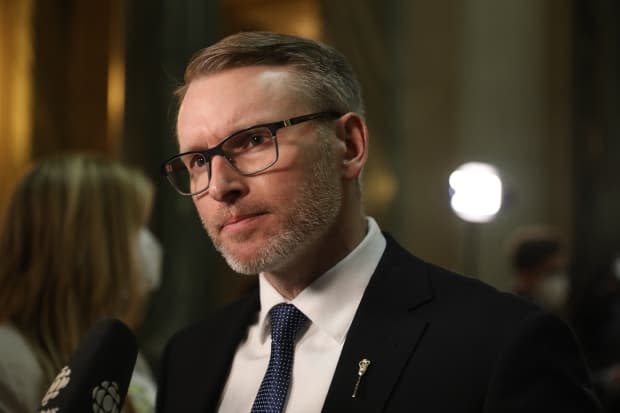Medical clinics in Warman, Martensville don't have enough doctors, physicians say

Physicians in the two fastest-growing cities in Saskatchewan say they are overwhelmed by demand in medical clinics and don't have enough doctors to serve the needs of their communities.
The walk-in clinic at Martensville Collective Health and Wellness will be suspended as of April 18 so that doctors can strictly focus on primary care.
"In the last two months, our numbers for walk-in have doubled, which has just put a lot of strain on our physicians," said Dr. Allison Adamus in an interview with Saskatoon Morning host Leisha Grebinski.
There is a three to four hour wait each day at the clinic, according to Adamus.
Legends Medical Clinic, which is currently the only clinic in Warman seeing walk-in patients, also has wait times of more than three hours.
"We want to extend our apologies for our long walk-in wait times of late," the clinic wrote in an April 1 Facebook post.
"Please refrain from taking your frustration out on our lovely staff, but instead contact your MLA so that there will be changes and improvements made by local governments to recruit and retain doctors to our communities."
Martensville is roughly 10 kilometres north of Saskatoon, while Warman is about 20 kilometres north of the city.
"Post COVID, we are seeing more people coming to the doctors. So I think that's part of the problem," said Dr. Marcel Smit, a physician at Legends Medical Clinic, but he insisted the inherent issue is the lack of doctors and patients not having their own primary care physicians.
LISTEN | Dr. Adamus and Dr. Smit discuss lack of doctors in their cities
'Bedroom' community
Warman was considered rural by the province until 2015, when it was reclassified as a "bedroom" community.
Its rural status meant that doctors could work there to fulfil their return of service requirements. Family physicians have to work in a rural community or certain regional centres for a few years after graduation in exchange for provincial funding. They haven't been able to do so in Warman since the reclassification seven years ago.
At a conference in Regina last week, Warman mayor Gary Philipchuk told provincial ministers that medical clinics "have exhausted all options trying to recruit doctors because of this unnecessary regulation," adding that "this has reached a crisis level."
Minister of Rural and Remote Health Everett Hindley said the government is looking at ways to recruit and retain doctors in Warman and other communities. Health Minister Paul Merriman said Saskatchewan is competing with the rest of the country and North America for health-care providers.
"We need to backfill a lot of physicians and are trying to do that as fast as possible," Merriman said, citing the new agency announced in the 2022-23 budget to recruit and retain health-care workers.

Unique solutions
Dr. Adamus said the issues in Warman and Martensville require solutions at multiple levels.
"Our communities are unique in this province. They don't fit into a box like most of our other communities do. The solutions have to be equally unique," she said.
Adamus said she wants to see city officials find ways to to support physician services in the community, whether that be through community funded health centres or other ways to make the communities more attractive for physicians.
"A big responsibility lies with the provincial government to start levelling the playing field when it comes to recruitment and retention," she said.
"I think the first place it has to start is deciding if we're rural or urban, and then starting to service our communities as such."


